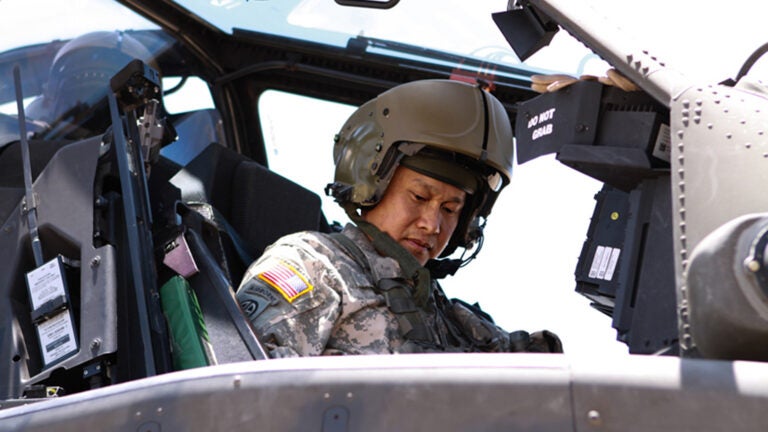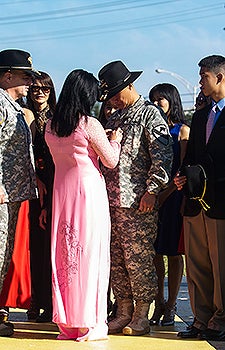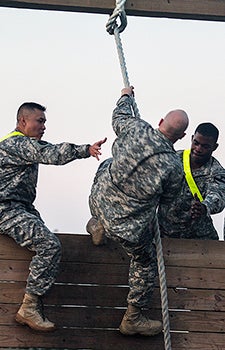
Star Soldier
In 1975, when Viet Luong was 9 years old he escaped the ravages of wartorn Vietnam aboard a United States aircraft carrier along with his parents and seven sisters. The following day, Saigon fell.
“My father, who had fought with the South Vietnamese Marine Corps, had managed to get us the necessary papers to be extracted as political refugees by regular U.S. C-130 airplanes,” Luong said. “But before we could leave, the Communists seized all airport operations and started shelling the airport.
“We thought we were doomed.”
Fortunately for Luong and his family and thousands of other Vietnamese refugees in danger of Communist reprisals, the U.S. government implemented Operation Frequent Wind, a non-combatant civilian evacuation.
Using U.S. marine helicopters that can maneuver more easily and were less susceptible to Communist fire, U.S. soldiers flew Luong and his family to a U.S. Navy aircraft carrier, the USS Hancock.
“We barely escaped,” Luong said. “My sisters and I were scared to death. When we landed on the USS Hancock it was so big we didn’t know where we were. We asked our father ‘Dad, where are we?’ He said ‘We’re on a U.S. carrier.’ We said ‘What does that mean?’ And he replied, ‘It means nothing in the world can harm you now.’
“I get choked up just talking about it.”
As he stood on the deck of the USS Hancock, Luong realized that he wanted to serve in order to give back to the nation that had saved him and his family from almost certain death.

Thirty nine years later, Brig. Gen. Viet Luong pinned on his first star during a ceremony held on Aug. 6 at Fort Hood, Texas, becoming the first Vietnamese-born general officer in the U.S. military.
Luong is the 1st Cavalry Division’s deputy commanding general for maneuver. The infantry officer commanded a battalion of 82nd Airborne Division paratroopers in Iraq from 2007-08 and led the 101st Airborne Division’s 3rd Brigade Combat Team, the storied Rakkasans, into combat in Afghanistan from 2010-11.
Luong said the promotion was a huge honor, but credited his men with helping him get there.
“I just try and do the best I can in every job given,” he said. “I would not be where I am today without all the help I have received from my subordinates and superiors.”
Luong served in Haiti, Bosnia and Kosovo, where he felt he was able to make a difference. He found his experience commanding troops in Afghanistan and Iraq much tougher.
“It’s been the pinnacle of my 27-year military career to be able to command in combat, but it’s much more solemn when you lose soldiers. You realize the price of freedom is very high,” he said. “I don’t know if you can ever really deal with something like that. You go through periods where you think of these men all the time. As a commander you are really responsible for their lives. So you try to think critically about how you could have done things better.”
Luong said it helped him to memorialize the fallen warriors under his command.
“I spend time keeping in touch with their spouses and parents and visit memorials. It’s a way of healing.”
Luong’s childhood experiences remain vivid. Arriving in the U.S., Luong and his family were taken to Fort Chaffee, Arkansas, which was set up to receive refugees from Vietnam.
They stayed there for about two months, until one of his father’s friends helped the family resettle in Los Angeles.
From nothing, the family started again. His father, who had majored in English literature and served as a senior officer, found work as an armed security guard, while Luong’s mother worked in a fast food restaurant. Luong’s older sisters worked, too, but when one was robbed at gunpoint while working at a Hollywood gas station, Luong’s father decided all his children were going to college.
Growing up in a tough Los Angeles neighborhood, Luong said he and his family viewed USC as an elite institution, accessible only to the children of the privileged.
“Most of us had our eye on the state schools, so although I applied to USC I never really thought I would be able to go there.”

Luong initially considered joining the Marine Corps to become an infantryman like his father. However, a chance encounter with a Reserve Officers’ Training Corps (ROTC) instructor at USC changed his life.
“He was an airborne-qualified sergeant major and I was enamored by the fact he was a paratrooper because that’s what I wanted to be. Plus, he had served in Vietnam.”
When the instructor told Luong about ROTC scholarships, the young man listened.
In 1983, Luong was accepted at USC with a full ROTC scholarship. “It was a bold move to go to USC,” he said. “I chose USC not only for its legacy of academic excellence, but also because of how its alumni have fared in Southern California.”
At USC Dornsife, Luong majored in biological sciences, graduating in 1987.
“It might not be the major you would expect, but being a science major taught me to think critically,” he said. “I can cut through a lot of fluff and get to the root of the problem and that has been one of my greatest strengths in my career.
“The outstanding experience I had at USC Dornsife, academically as well as socially, and being able to deal with some pretty high achieving people taught me how to seek out success and step out of my comfort zone.”
Luong is preparing to return to Afghanistan later this year where he will lead Train, Advise and Assist Command-South as part of the ongoing transition and drawdown in the country.
“Being the first one of anything comes with a price, whether you want the responsibility or not, you’re it,” Luong said. “There are a lot of expectations from the Vietnamese diaspora, not only in the U.S. but throughout the world. You just try to do the best you can with the mission you have been given. Take care of your subordinates and treat people with dignity and respect. Lead from the front.”
Luong said he feels tremendous patriotism for the country that not only saved his life but also helped his family assimilate and fulfill their aspirations through education.
“At the end of the day, you have to ask yourself what are you doing to contribute to our nation?”